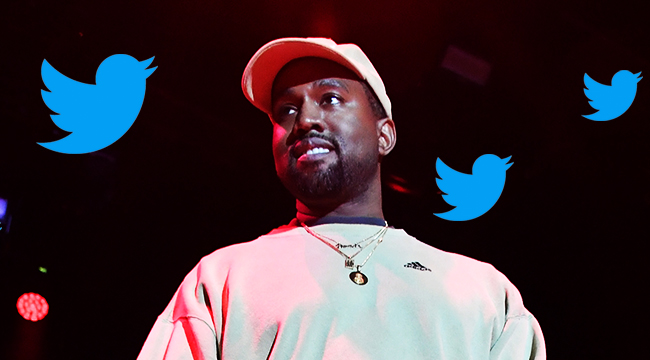
“I am a god,” Kanye West once rapped on the appropriately titled “I Am A God.” Despite every self-aggrandizing thing Kanye has ever said about himself, though, he doesn’t truly believe that.
If he did, he wouldn’t have so many questions. If he was a god, that would mean he’s omnipotent and all-knowing. There would be no need for him to ponder the nature of things like creativity, authenticity, love, happiness, and life if he had the answers already. If he was a god, he would have no use for philosophy, and yet, he’s writing a philosophy book.
https://twitter.com/kanyewest/status/986629639874297856
What is a book, though? Books used to be bound collections of paper that presented information and still are in some cases, but now there are e-books, audiobooks, and probably other varieties of book that I haven’t heard of that broaden and warp that definition further. Heck, apparently a Twitter account is a book now, according to Kanye. He returned to tweeting recently and wrote:
“Oh by the way, this is my book that I’m writing in real time. No publisher or publicist will tell me what to put where or how many pages to write. This is not a financial opportunity, this is an innate need to be expressive.”
https://twitter.com/kanyewest/status/986625627364077568
Given Kanye’s history with questioning the structure of things, this makes sense: If The Life Of Pablo is never truly finished and can be altered whenever he feels it appropriate, then why can’t a book be the same way: Fluid and always in progress? Twitter is the ideal platform for Kanye to live out this idea: His ability to instantaneously express himself without any external filter is limited only by how many ideas he has and how quickly he can peck out the letters on his phone.
As I said, though, this challenges how we think about books in a critical sense. I’m admittedly not a huge reader (which surprises everybody who learns that about me since I write for a living): Like Kanye, I’m interested in a variety of creative and artistic endeavors, and my work involves enough reading where I’d rather spend my leisure time exploring things like video games, basketball, and cooking. But, I do know that books, like any creative work, are reviewed and judged on how well they achieve their goals and if they’re enjoyable. So, with that in mind, let’s review Kanye’s “book,” treating the aforementioned tweet of his as a thesis statement.
https://twitter.com/kanyewest/status/986647008176881664
What is Kanye’s goal with his book, which he’s previously called Break The Simulation? To provide a ham-fisted definition, the aim of psychology is to explore the problems with the nature of life, values, knowledge, and other heady overarching topics like that. This doesn’t mean one has to provide concrete answers to the questions that come up when faced with uncertainty while thinking about these ideas, because they often don’t exist, but it does mean giving these fields of thinking serious attention and attempting to gain knowledge through the intellectual exploration of them.
This involves challenging the widely assumed truth, and indeed, Kanye has done that in his few days back on Twitter. To cite a few examples, he questions society’s adversarial nature (“Stop looking for something to beat and just be”), the concept of wealth (“As a creative, your ideas are your strongest form of currency”), and the value of acceptance versus that of individuality (“don’t trade your authenticity for approval”).
https://twitter.com/kanyewest/status/986629658211844097
More than just general psychology, though, Kanye’s tweets, whether inadvertent or not, explore the psychology of Kanye himself. The act of posting his paradigm-questioning missives shows that Kanye wants to share, inspire, and inform, and his tweets about things like his in-progress shoe designs, tattoo ideas, and fabric swatches convey that Kanye wants us to have greater insight into how his mind works. Again, whether or not it’s inadvertent, these personal tweets accomplish some world-building in this book of his, providing context for his philosophical tweets that help a reader to realize the lens through which they were conceived, and thus to have a more complete understanding of them.
Whereas most musicians use their social media to promote their latest projects, it truly seems like Kanye writes his tweets mainly to fulfill his “innate need to be expressive” (it remains to be seen if the tone of Kanye’s Twitter will shift when he has new music on the way). Expression is definitely the primary objective here: The questions Kanye asks on Twitter are implied, because all we get are the answers, and that in itself is revealing. The psychology of Kanye West isn’t about the questions he asks, but about the answers he comes to. It’s not about the broader implications of the ideas he considers, but about how mindsets and consequences apply to him.
https://twitter.com/kanyewest/status/986687322140721152
Whether his tweets are perceived as profound explorations of human nature or bloviating pseudo-insights, Kanye is going to be Kanye, which is great for Kanye fans who hang onto his every word, but perhaps not as enjoyable for those more critical or dismissive of the rapper’s rants. In that sense, Kanye’s book achieves its goals, because it is very Kanye in its refusal to, as he recently tweeted, trade its authenticity for approval. Instead, the book strives for approval through authenticity. After all, who in their right Kanye-loving mind wouldn’t approve of a regular stream of his authentic thoughts, which are significant and meaningful enough to turn a platform usually reserved for memes and self-promotion into literature?
Hmm, maybe he is a god.






